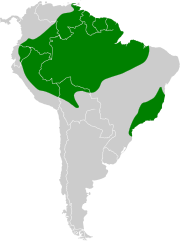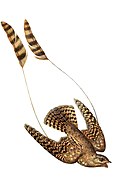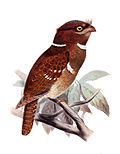Heliothryx
| Heliothryx | |
|---|---|

| |
| Purple-crowned fairy (Heliothryx barroti) | |
| Scientific classification | |
| Domain: | Eukaryota |
| Kingdom: | Animalia |
| Phylum: | Chordata |
| Class: | Aves |
| Clade: | Strisores |
| Order: | Apodiformes |
| Family: | Trochilidae |
| Subfamily: | Polytminae |
| Genus: | Heliothryx F. Boie, 1831 |
| Type species | |
| Trochilus auritus (black-eared fairy) Gmelin, JF, 1788
| |
| Species | |
|
2, see text | |
Heliothryx is a genus of hummingbird in the family Trochilidae. The genus is assigned to the subfamily Polytminae which is sometimes referred to by the informal name "mangoes".
Taxonomy
[edit]The genus Heliothryx was introduced in 1831 by the German zoologist Friedrich Boie.[1] Boie did not specify the type species but this was designated as the black-eared fairy by George Robert Gray in 1840.[2][3] The genus name combines the Ancient Greek hēlios meaning "sun" with thrix meaning "hair".[4]
The genus contains the following two species:[5]
Physical Description and Habitat
[edit]Heliothryx hummingbirds are vibrant, medium-sized birds of tropical lowlands, favoring forest edges, clearings, and gardens. They have emerald-green upperparts, snow-white underparts, and white tail feathers, with sharp black bills perfectly designed to extract nectar. Males have a purple crown, absent in females, who have longer tails.[6]
| Common name | Scientific name and subspecies | Range | Size and ecology | IUCN status and estimated population |
|---|---|---|---|---|
| Black-eared fairy | Heliothryx auritus (Gmelin, JF, 1788) Three subspecies |
Bolivia, Brazil, Colombia, Ecuador, French Guiana, Guyana, Peru, Suriname, and Venezuela
|
Size: Habitat: Diet: |
LC
|
| Purple-crowned fairy | Heliothryx barroti (Bourcier, 1843) |
southeastern Mexico south to southwestern Ecuador.
|
Size: Habitat: Diet: |
LC
|
References
[edit]- ^ Boie, Friedrich (1831). "Bemerkungen über Species und einige ornithologische Familien und Sippen". Isis von Oken (in German). Cols 538–548 [547].
- ^ Gray, George Robert (1840). A List of the Genera of Birds : with an Indication of the Typical Species of Each Genus. London: R. and J.E. Taylor. p. 14.
- ^ Peters, James Lee, ed. (1945). Check-List of Birds of the World. Vol. 5. Cambridge, Massachusetts: Harvard University Press. p. 126.
- ^ Jobling, James A. (2010). The Helm Dictionary of Scientific Bird Names. London: Christopher Helm. p. 188. ISBN 978-1-4081-2501-4.
- ^ Gill, Frank; Donsker, David; Rasmussen, Pamela, eds. (January 2022). "Hummingbirds". IOC World Bird List Version 12.1. International Ornithologists' Union. Retrieved 11 July 2022.
- ^ "Purple-crowned Fairy - eBird". ebird.org. Retrieved 2025-01-09.









